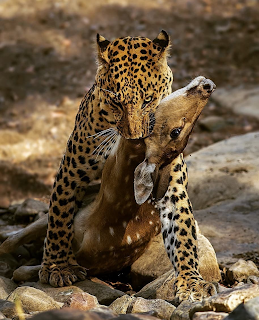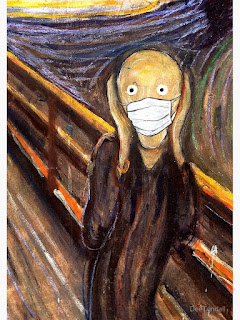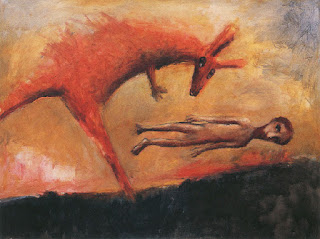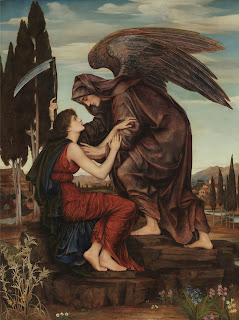Malcolm McLaren and friends in a photo taken outside
Nostalgia of Mud by Neil MacKenzie Matthews (1982)
I.
The phrase nostalgie de la boue was coined in 1855 by the French playwright Émile Augier [1].
It refers to a decadent attraction to primitive culture or a yearning for some form of debased experience outside of what is regarded as socially and morally acceptable according to the bourgeois norms and conventions of European civilisation [2].
One might even think of it in terms of Freud's death drive; i.e., as a desire on the part of complex life to revert to an earlier stage of evolution that allows one to contentedly wallow in a primordial mud pool (though when Augier used the phase he was thinking of the desire to return to humble social origins, rather than the origins of life [3]).
For me, the phrase nostalgie de la boue has a further resonance, however; one that is rooted in the music and fashion of the early-mid 1980s - a time of buffalo gals, b-boys, hobo-punks, and Zulus on a time bomb ...
II.
Malcolm McLaren and Vivienne Westwood opened their new (short-lived) West End shop in March 1982. Located at 5, St. Christopher's Place, it was spitting distance from Selfridges (but a long way from King's Road).
Ben Westwood recalls:
"The shop front was covered by a 3-D relief of the map of the world made
out of plaster and coloured mud brown. The interior featured the
cave-like look of an archaeological dig. Scaffolding surrounded the
walls, brown tarpaulin was stretched across the ceiling and a central
pillar (or stalagmite) rose out of a bubbling pool of oily liquid." [4]
What Ben doesn't offer is an explanation for the name of the shop - Nostalgia of Mud - except to say that this was also the name of Vivienne and Malcolm's inspired Worlds End collection for A/W 1983 [5].
Keen-eyed readers will immediately notice the unusual translation of the original French phrase discussed above; nostalgia of mud, rather than the more standard nostalgia for mud.
I don't know why this was so: I doubt that Malcolm wished to assign agency to the mud, as if it were the earth itself yearning for something. Probably he just mistranslated or misremembered the phrase. It doesn't really matter, I suppose - and, to be honest, I rather like the idiosyncratic reworking of nostalgie de la boue.
As to when McLaren first heard the phrase, or from where he took it, again, I don't know ...
Paul Gorman reminds us in his biography of McLaren, that it can be found in Tom Wolfe's famous essay 'Radical Chic' (1970), where it is used to mock those rich white liberals who host fundraising parties for revolutionary groups like the Black Panthers and thus seemingly endorse a brand of militant radicalism that would violently drag them from their own elevated social position [6].
But I'm not convinced that McLaren took the phrase from Wolfe. And even if he did, he means something very different from what the American author means by it, giving the term mud a wholly positive new interpretation [7].
Anyway, let's close by giving the last word to Malcolm himself:
"I wanted the shop to look
permanently closed down, making it appear as if we were digging up the
place to find the London that lay under the pavements and eventually I
found that all that lay under there was mud." [8]
Notes
[1] See Émile Augier, Le Mariage d'Olympe (1855), Act I, Scene I.
Interestingly, however, as Rosalind Krauss points out, the expression nostalgie de la boue "is not in fact idiomatic French; indeed, it is not part of spoken French usage at all, being instead a purely Anglophonic invocation of the English notion of slumming transposed into the magically resonant frame of a supposedly French turn of phrase". See her essay 'Nostalgie de la Boue', in October, Vol. 56, (The MIT Press, Spring, 1991), pp. 111-120. The line quoted is on p. 112.
[2] Sir Clifford Chatterley famously accuses his wife of being
"'one of those half-insane, perverted women who must run after
depravity, the nostalgie de la boue'" after she confesses her affair with the gamekeeper. Suddenly seeing himself as the embodiment of moral goodness, Clifford regards Connie and Mellors as "the incarnation of mud, of evil".
See Lady Chatterley's Lover, ed. Michael Squires, (Cambridge University Press, 1993), p. 296.
[3] In Act I, Scene I of Le Mariage d'Olympe, Augier wrote: "Mettez un canard sur un lac au milieu des cygnes, vous verrez qu’il regrettera sa mare et finira par y retourner." We might trans-paraphrase this as: Put a duck rocker amongst clean-cut new romantics, and you'll see that he soon longs for a muddy hole that he can retreat to.
[4] Ben Westwood writing in a post entitled 'Nostalgia of Mud' on the World's End blog (20 Feb 2014): click here. Note I have very slightly modified the text.
[5] Rather than try to describe this collection, I encourage readers to watch a ten minute video posted by Ben Westwood on YouTube, which affords a glimpse of the magical scenes that unfolded on the catwalk in the Pillar Hall (Olympia), on 24 March, 1982: click here.
[6] Tom Wolfe's essay, 'Radical Chic: That Party at Lenny's', originally appeared in New York magazine (June 8, 1970): click here to read online. Paul Gorman mentions it in The Life and Times of Malcolm McLaren, (Constable, 2020), p. 496.
For my take on the question of radical chic - with reference to the case of AOC - click here.
[7] As I wrote in an earlier post, for McLaren, the term mud implied more than merely low-life experience
or primitive culture. It was a glorious synonym for authenticity,
something that he has always striven for in his work; the true look of
music and the real sound of fashion (even though he surely knew,
as a reader of Wilde, that realism is just a pose and authenticity
merely another form of fabricated reality or myth).
Critics of McLaren will doubtless argue at this point that he is another prime example of the sort of person Wolfe is satirising; someone who exploits the experiences and appropriates the cultural cachet of those he liked to call the dispossessed; someone claiming to be nostalgic for mud, whilst rarely getting their own hands dirty in the process of making cash from chaos. For me, however, there's a big difference between Malcolm and someone like Leonard Bernstein.
[8] Malcolm McLaren, quoted by Paul Gorman in The Life and Times of Malcolm McLaren, p. 497.











